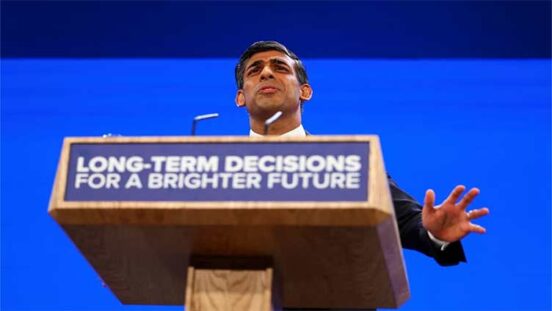MANCHESTER -UNS/Reuters: British Prime Minister Rishi Sunak sets out plans to overhaul post-16 education in England with a new qualification and promises a tax-free bonus of up to 30,000 pounds ($36,372) to help attract and retain teachers in key school subjects.
The government said it would provide an initial 600 million pounds of funding over two years to help support teacher recruitment and retention and lay the groundwork for a new qualification for 16-19 year-olds.
The Advanced British Standard, which the government said it did not expect to introduce for more than a decade, would see most students study a minimum of five subjects, compared to three under the current A-level system.
It will also incorporate the current T-level qualification, focused on vocational skills, so students have the option to take a mix of technical and academic subjects, with all students also required to study some form of maths and English to age 18.
“Education is the closest thing we have to a silver bullet – it is the best economic policy, the best social policy and the best moral policy,” Sunak said in a statement, adding the changes would bring England into line with other major western economies including France, Germany, Japan and the United States.
“The plan we have set out today … represents real, meaningful reform that will put technical and academic education on an equal footing and ensure that all young people leave school or college knowing the basics in maths and English.”
Children currently aged 4-5 years-old, who started primary school this year, are expected to be the first cohort to take the Advanced British Standard, the government said.
The National Education Union (NEU), Britain’s largest education trade union with more than 450,000 members, said the recruitment crisis in schools was caused by “excessive workload and below inflation pay” which would not be solved by bonuses.
“Rishi Sunak is doubling down on pie-in-the-sky education policies. He is completely out of touch with reality,” NEU General Secretary Daniel Kebede said.
Newspaper The Guardian quoted a Conservative source as saying that the prime minister was determined to press ahead with the plan, having initially suggested the idea during his unsuccessful leadership campaign against Liz Truss last year.
The Tory source added: “He came back from the summer with a series of things he wanted to move on. A-level reform is a critical part of it.”
In 2021, the EDSK education think-tank concluded that A-levels were too narrow and should be replaced with a three-year “baccalaureate” that covers all academic, applied and technical courses.
Its report said students should be required to study English and maths up to the age of 18, in line with other developed nations.
The EDSK report warned that the dominance of A-levels in the English education system had relegated applied and technical courses to second-class status.
About half of 18-year-olds in England take A-levels, meaning they typically sit exams in three subjects. Rather than narrowing down choices, the baccalaureate would in theory allow students to retain more breadth in their studies and only gradually specialise over the three-year programme.
A senior government source told the Times that options were being looked into and no final decision had been taken.
Robert Halfon, the former chairman of the education select committee, has previously backed the idea of a British baccalaureate. He said: “The advantage of the British baccalaureate is it will mean that students have a much wider curriculum so they get the skills that they need and employers want.”
A-levels were first awarded in 1951 in England, Wales and Northern Ireland and until the early 1960s, the qualification was awarded only at the grades of pass and distinction.
A Department for Education spokesperson said: “Since 2010 we have made huge progress in driving up school standards and giving young people the best start in life, with record funding for schools and more full-time teachers than ever before.
“We have already taken steps to reform the post-16 qualifications landscape, including reforming technical education and delivering millions of new high-quality apprenticeships.
“Alongside this, we have set out bold plans to ensure that every young person studies some form of maths up to the age of 18 to give them the skills they need to succeed in the jobs of the future.”




